May 17, 2025 | 11:11 GMT +7
May 17, 2025 | 11:11 GMT +7
Hotline: 0913.378.918
May 17, 2025 | 11:11 GMT +7
Hotline: 0913.378.918
The owner of the largest "lotus village" in the country, with over 50 hectares in area, is farmer La Quang Khanh, from Lieu Tri village, Me Linh commune, Me Linh district, Hanoi. His family was crowded with 12 brothers, previously they planted 2 rice crops per year, struggled and still suffered from constant hunger.
Since 1994, people in the village began to shift to growing roses, gradually made money, but these flowers were poisoned by countless chemical drugs that affected the soil, water and sweat-soaked shoulders during the farming process.
Also engrossed in chasing the dream of getting rich from planting roses, the one-crop rice fields surrounding the village pond were gradually abandoned. Looking at that wasteland, Mr. Khanh suddenly came up with the idea of renting land to grow lotus and asked the village head to inform all the villagers to go to the meeting hall to negotiate with the rate of 25 kg of rice/sao/year. That was 2017.
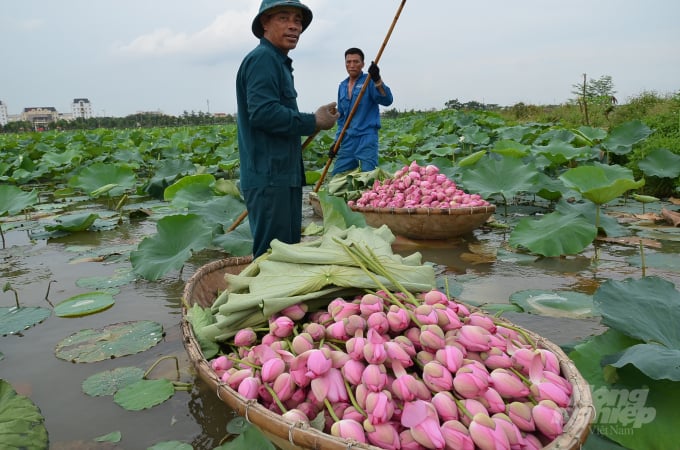
Harvesting lotus in the lagoon. Photo: Duong Dinh Tuong.
At first, he only rented an area of 15 hectares, then gradually expanded, and by now, it has reached 52 hectares in the two villages of Lieu Tri and Ha Loi. From growing lotuses to selling flowers, marinating tea, for the past 3 years, he has been tinkering with how to grow lotuses to sell as photographic backdrops for customers, and sell fresh air to customers fleeing urban pollution. The fee to keep the flowers for each customer who visited to take photos, experience is 30,000 VND for adults, and free for accompanying children, unlimited time, customers can stay for the whole session or all day.
During the winter, his lotus pond attracts several hundred people: "The lotus season begins on May 19, visitors come to experience, in the morning from 4:30 to 7 a.m., they can take a boat trip with workers to pick Bach Diep Tay Ho pink lotus because this variety must be collected before sunrise, when the flower has barely bloomed to retain its original fragrance.
After picking, the guests return to make lotus tea with the artisans by dropping the tea into each lotus flower and then wrapping it in a loose bag. From 7am to 9am, the flowers must be tied, put in water; raise them overnight, cut off the stalks early the next day, vacuum seal them and store in the freezer. Thai Nguyen's Tan Cuong tea is the best for marinating lotus, at about 60 lotus flowers per kilogram. We are selling this tea at 1.2 million/kg.
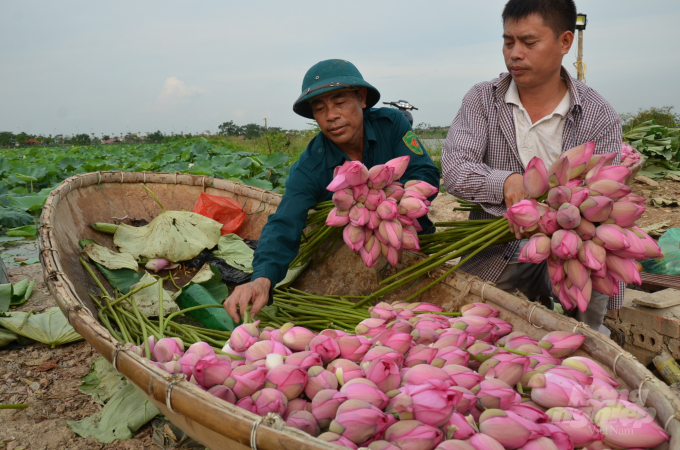
Khanh (on the right) harvesting lotus. Photo: Duong Dinh Tuong.
The traditional dry-cured tea line is even more sophisticated, you have to pick a lotus flower, separate the rice within it, spread layer of tea and layer of rice intertwining then steam it. It takes 1,500 lotus flowers to make 1kg of tea, and it takes over 20 days to complete a batch. With so many sophisticated stages, the price is about 8-10 million VND/kg. This special tea is aimed at high-class customers or sent abroad as gifts.
In the afternoon from 4pm, guests can experience picking Tay Ho white lotus and Quan Am white lotus, bunched in a bouquet of 10 flowers, this is usually sold to Quang Ba flower market in the inner city of Hanoi for display, not for tea because it is less fragrant. In the high season, I collect 10,000 lotus flowers of all kinds daily, sell them to the market and to customers on the spot along with tea products.”
Additionally, the activity of taking photos to check in with the lotus pond is also popular, which is most suitable from 7am and 4pm onwards, when the daily is still soft enough, ensuring the best frames. There are groups of customers so engrossed in taking pictures that it is sunny at 37-38 degrees Celsius all day outside, their faces are bright red, the owner of the pond is worried that the customers might be sick, but they still talk and laugh carefreely.
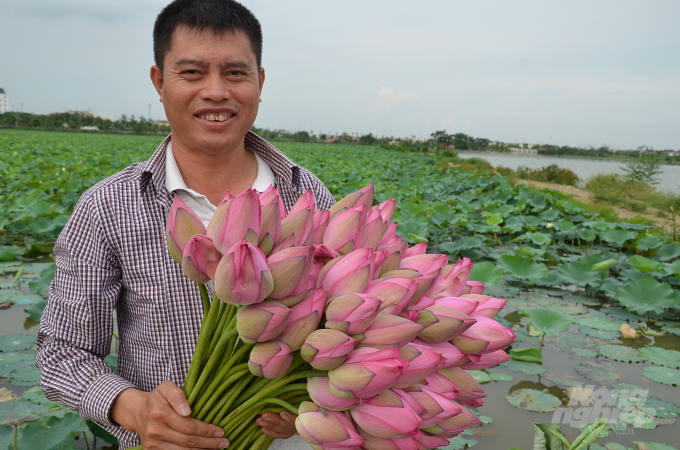
The joy of the lotus pond owner. Photo: Duong Dinh Tuong.
After taking pictures outside the pond, guests can also enjoy the aroma of a cup of lotus tea right in the windy huts.
“In the lotus season, I don't use pesticides, so I can utilize many parts such as lotus root, lotus fruit, lotus leaf and lotus flower to process into clean teas such as lotus-marinated tea, lotus heart tea, lotus seeds, lotus leaf tea… In addition, lotus is also a condiment, an ingredient of very unique culinary dishes such as lotus candy, lotus root salad, lotus root stewed with Northern medicine... that I really want to serve to customers but because this is agricultural land, I cannot open a restaurant. However, guests can bring their own food, set up umbrellas, tents and tarpaulins to eat right on the shore of the pond or we can take their order to process so they can relax at the leaf huts while enjoying the wind and lotus viewing.
The fish in the lotus pond is not raised with industrial food so it is very delicious, but not everyone knows about it because there is no brand name. Therefore, tons of fish harvested at the end of the year and I still have to sell them at the market, with the price only equal to that of normal fish, at about 50-55,000 VND/kg, this is very disadvantageous! In addition to fish, I also release 2 litters of ducks when the lotus season is over, swimming in a large pond, their meat quality is completely different", said Khanh.
"Visitors who come to experience right at the lotus pond of Mr. Khanh can also connect with many other tourist attractions such as for spiritual tourism, visit Hai Ba Trung temple; For agricultural tourism, go through Trang Viet to pluck vegetables; For roses travel, go to Me Linh; For eco-tourism goes to Uncle Ho hill in Thanh Lam commune.

White lotus flowers. Photo: Duong Dinh Tuong.
"If you want to go fast, go alone, if you want to go far, go together", recently Mr. Khanh founded a cooperative specializing in lotus with more than 10 members but the core is still himself because he has over 50 hectares of lotus, There are sublimation dryers, vacuum sealing machines and 100m3 of cold storage to preserve tea. The other members only contributed land, but because of their contribution to mobilizing people to accumulate fields, they authorize him all to carry out all activities of the cooperative, and then distribute profits in the form of shareholders.
Currently, Me Linh district is planning many transportation and urban development projects, which may affect the lotus cultivation here in the near future. In order to establish a more stable material area, Mr. Khanh is looking for suitable areas in other districts such as Phuc Tho and My Duc in Hanoi. With the brand name Bach Thien lotus Hai Linh, his cooperative strives to diversify over 10 products of lotus, the first of which this year will be to invest in a sublimation dryer to dry the lotus with tea inside, helping to prevent the need to be frozen as before...
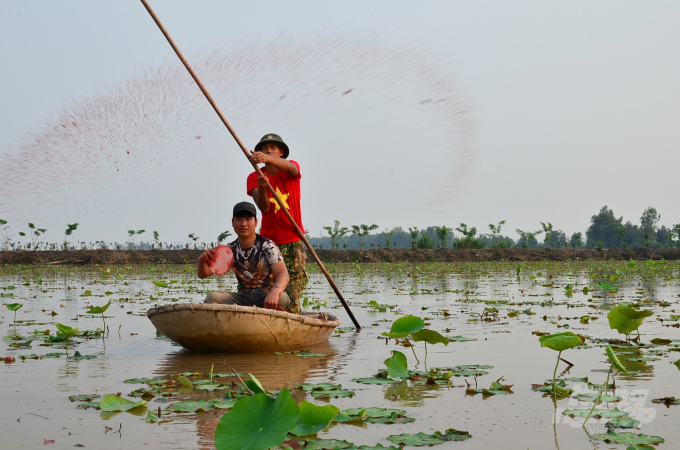
Fertilizing lotus at the beginning of each season. Photo: Duong Dinh Tuong.
In the national science and technology task "Research on building lotus villages for sustainable development in association with tourism in Vietnam" proposed by Dr. Tran Thi Quoc Khanh, Member of Hanoi National Assembly, has an idea of lotus villages along the length of the country.
Specifically, the project will build at least 3 models of lotus villages associated with tourism in Hanoi, Thua Thien Hue, Dong Thap and further research to add Ly Nhan district of Ha Nam province. The objective is to select a set of lotus varieties and suitable planting processes for the regions; Technology for processing and preserving lotus products; Complete the structure of lotus villages associated with tourism; Trade promotion of lotus products…
This model is liked by Mr. Khanh in that it can help increase the value of lotus plants as well as sustainably develop the lotus profession: "I am thinking of having to link with other lotus regions in the country to be able to open the lotus flower supermarket. Here, the specialty is growing lotus flowers, so it suitable for flowers enjoyment and marinating tea, lotus seeds (kneeling lotus) is a specialty of Hung Yen, or Dong Thap specializes in many products from lotus such as lotus candy, lotus jam, lotus paintings... How can guests visiting Dong Thap drink Tay Ho lotus tea while enjoying Dong Thap lotus products, or lotus silk from My Duc (Hanoi), lotus seeds from Hung Yen... ”
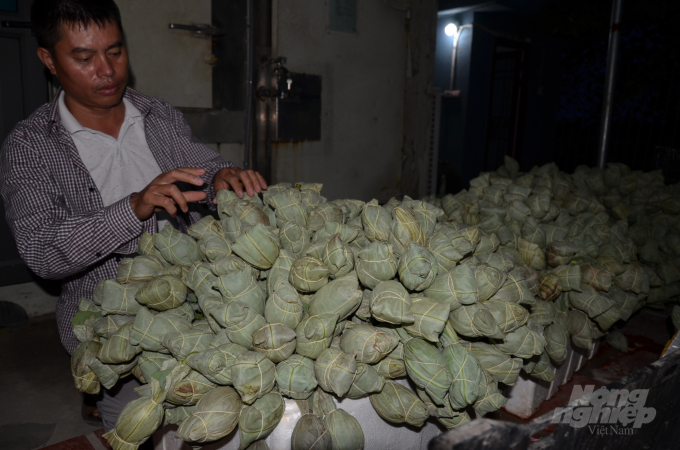
Mr. Khanh next to packages of recently wrapped lotus tea. Photo: Duong Dinh Tuong.
As he spoke, Mr. Khanh leisurely boiled water, peeled from a lotus flower, put a pinch in the kettle, waited for it to soak, and then we sat down to chat. The pace of life in the lotus pond is slow but peaceful, when it's time to eat, we eat, when it's time to sleep, we sleep. There is no need to turn on the air conditioner because there is a wind in the field, no competition because people are friends and like make friends with lotus, despite the hustle and bustle of daily life.
In 2017, Dr. Tran Thi Quoc Khanh collaborated with artisan Phan Thi Thuan in Phung Xa commune (My Duc district, Hanoi city) to successfully deploy yarn from lotus silk to weave into cloth, becoming the first Vietnamese to achieve this.
Translated by Nguyen Hai Long
/2025/05/16/3800-0-nongnghiep-143756.jpg)
(VAN) Suntory PepsiCo Vietnam coordinated with the Ministry of Education and Training to implement an education program on water conservation, reaching nearly 1 million primary school students nationwide.

(VAN) Vietnam’s TH Group officially put its high-tech fresh milk processing plant into operation in the Russian Federation, marking a historic moment as the first TH true MILK cartons were produced in Russia.

(VAN) Use of high-quality broodstock and biotechnology is regarded as the most effective approach to ensuring sustainable and economically viable shrimp aquaculture ahead of climate change and the emergence of increasingly intricate disease patterns.

(VAN) Carbon farming is a form of agricultural practices that helps absorb more greenhouse gases than it emits, through smart management of soil, crops, and livestock.

(VAN) This is a key content of the Memorandum of Understanding recently signed between the Vietnam Fisheries Society and Kunihiro Inc of Japan.

(VAN) To achieve the goal, local authorities and businesses in Kon Tum province have fully prepared the necessary conditions for the new Ngoc Linh ginseng planting season.
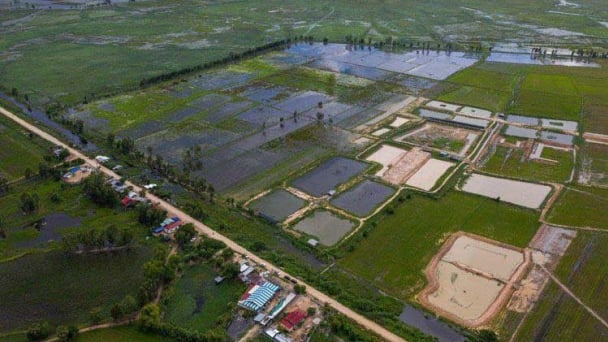
(VAN) Jiangsu province is gearing up to host training programs in Phnom Penh, the capital of Cambodia, this year to establish the Fish and Rice Corridor.